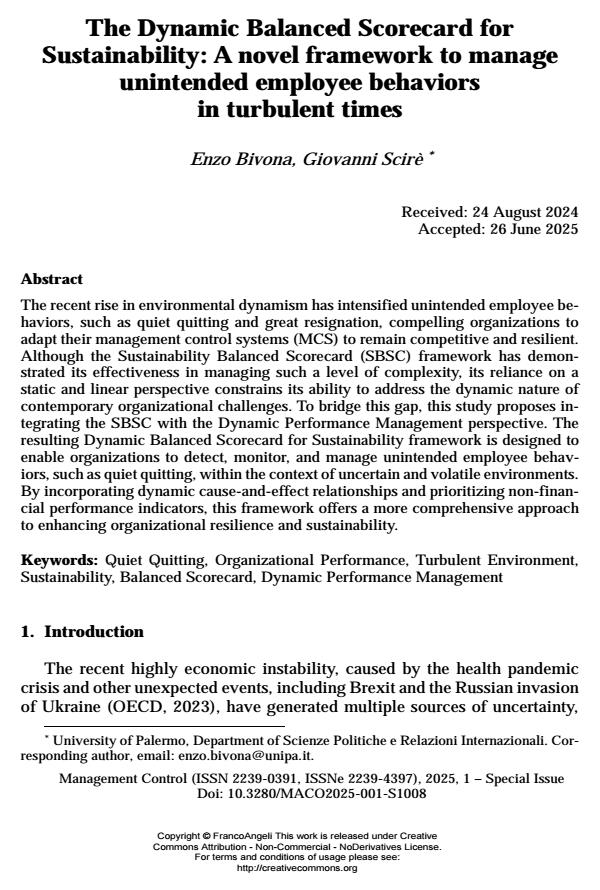The Dynamic Balanced Scorecard for Sustainability: A novel framework to manage unintended employee behaviors in turbulent times
Titolo Rivista MANAGEMENT CONTROL
Autori/Curatori Enzo Bivona, Giovanni Scirè
Anno di pubblicazione 2025 Fascicolo 2025/1 Suppl.
Lingua Inglese Numero pagine 24 P. 165-188 Dimensione file 260 KB
DOI 10.3280/MACO2025-001-S1008
Il DOI è il codice a barre della proprietà intellettuale: per saperne di più
clicca qui

FrancoAngeli è membro della Publishers International Linking Association, Inc (PILA)associazione indipendente e non profit per facilitare (attraverso i servizi tecnologici implementati da CrossRef.org) l’accesso degli studiosi ai contenuti digitali nelle pubblicazioni professionali e scientifiche
The recent rise in environmental dynamism has intensified unintended employee behaviors, such as quiet quitting and great resignation, compelling organizations to adapt their management control systems (MCS) to remain competitive and resilient. Although the Sustainability Balanced Scorecard (SBSC) framework has demonstrated its effectiveness in managing such a level of complexity, its reliance on a static and linear perspective constrains its ability to address the dynamic nature of contemporary organizational challenges. To bridge this gap, this study proposes integrating the SBSC with the Dynamic Performance Management perspective. The resulting Dynamic Balanced Scorecard for Sustainability framework is designed to enable organizations to detect, monitor, and manage unintended employee behaviors, such as quiet quitting, within the context of uncertain and volatile environments. By incorporating dynamic cause-and-effect relationships and prioritizing non-financial performance indicators, this framework offers a more comprehensive approach to enhancing organizational resilience and sustainability.
Parole chiave:Quiet Quitting, Organizational Performance, Turbulent Environment, Sustainability, Balanced Scorecard, Dynamic Performance Management
Enzo Bivona, Giovanni Scirè, The Dynamic Balanced Scorecard for Sustainability: A novel framework to manage unintended employee behaviors in turbulent times in "MANAGEMENT CONTROL" 1 Suppl./2025, pp 165-188, DOI: 10.3280/MACO2025-001-S1008